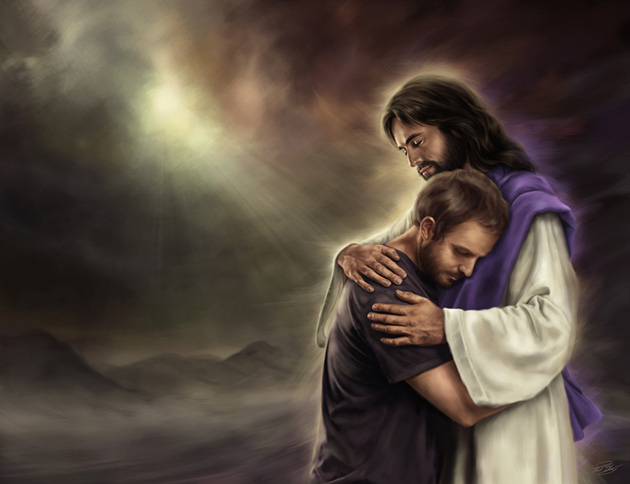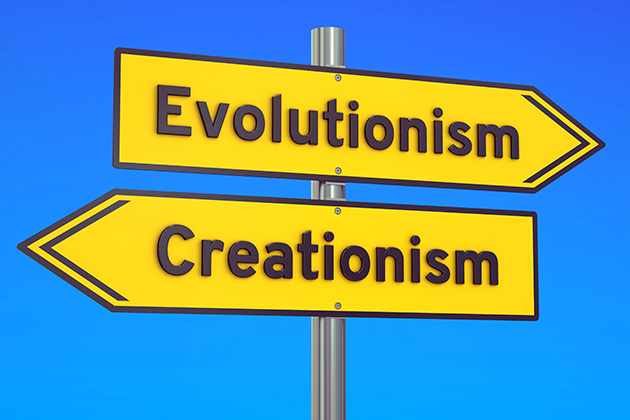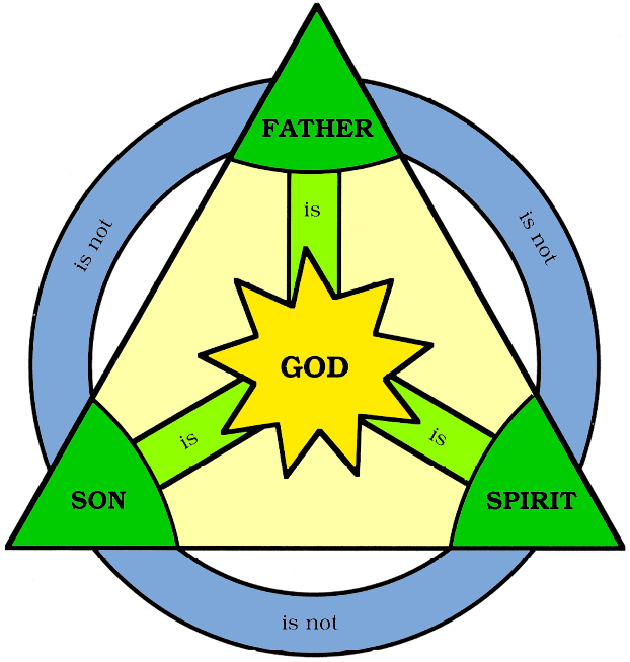
What evidence supports the existence of God?
Just look around you. There is convincing evidence for a creator in all the sophistication, detail and design of our world. For example, look at the human body with its elaborate nervous, cardiovascular, digestive, reproductive and musculoskeletal systems, not to mention just the brain alone. Or observe the patterns and connections in animals, plants, food chains and the universe, which contains our earth with the perfect conditions for life. Also, hidden from the naked eye, but visible under a microscope, the complexity of a single cell is astounding, from DNA to molecular machines. It is only logical to conclude that the intricacy of our world supports the existence of a creator and that life did not happen by chance. For more, visit the Does God Exist? page.
What is God like?
God is like no other. As indicated in the Bible, God is loving, kind, merciful, gracious, patient, faithful, good, wise, holy and perfect. He is supernatural. He is creator of all things, infinite, without origin, unchanging, all-powerful, all-knowing, self-sufficient, invisible and exists everywhere. God wants us to know him and have a relationship with him. He is also a God of justice who hates sin and must punish disobedience. Since we all sin and fail to meet God’s holy standard, he provided a way for our sins to be fully forgiven and to reconcile us to himself. It is through faith in his son, Jesus Christ, who paid the penalty for our sins by dying on a cross and then rising from the dead to reign in heaven. God wants all his followers to have confidence in him and his promises, including his assurance that nothing can separate us from him and a future in heaven. God loves us that much!

Does God love me even when I do wrong (sin)?
Yes! Absolutely! All of us sin and have regrets. As the Bible states: “All have sinned and fall short of the glory of God” (Romans 3:23).1 “There is no one righteous, not even one” (Romans 3:10).2 This is true for even notable people of the Bible, like Moses, David, Mary, Paul and Peter, and includes every person who has ever lived or will live (Jesus is the only exception because he is also fully God). You are not alone.
God loves you and wants you to admit your sins, turn away from them, accept Jesus Christ as Lord and Savior of your life, and live forever with him in heaven. “For God so loved the world, that he gave his only Son, that whoever believes in him should not perish but have eternal life” (John 3:16). God knows that none of us can be perfect. He is loving and gracious to forgive our sins as we put our trust in him. We do not deserve it, but he went to great lengths to freely offer it. For more, visit the Know God Personally page.

How can a loving and all-powerful God allow evil and suffering?
God hates evil and does not desire anyone to suffer. However, he created all people with free choice, allowing us to make bad decisions. He gave us that freedom, not wanting us to be mere puppets or robots. We all do things that hurt other people. We make decisions that lead to evil and its consequences. Should God stop our bad choices? Where would it begin and end? When the first humans, Adam and Eve, choose to disobey God, sin entered the world and the perfect world God intended became flawed. In this broken world, it should also not surprise us that there are natural disasters, sickness, and death.
God did not create evil, but he allows it to exist. He never promised a world without evil and suffering, but actually said that we will all experience it. Yet God relates and has compassion for those who suffer as demonstrated by sending his only son, Jesus, to suffer and die on our behalf. God, in his infinite power and knowledge, sees a bigger picture than we do. He often uses evil and suffering for our good even though it is hard to see or comprehend while on this earth. The presence of evil may also cause us to repent from our own evil ways and seek God in our lives. The good news is that one day God will bring evil and suffering to an end for those who follow Jesus Christ. They will live for eternity in heaven where there is no pain or suffering, only peace and joy.
How can a loving god send somebody to hell?
By his nature, God is love and is not capable of an unloving act. He does not want anyone to go to hell. God “desires all men to be saved [from the punishment of their sins] and come to the knowledge of the truth” (1 Timothy 2:4). He also is a holy and just god who abhors evil and therefore, must punish sin. The penalty for even one sin in a person’s life is eternity in hell. As a result of our God-ordained free will, we may choose to repent and be forgiven of our sins through faith in Jesus or reject him and face the consequences. God does not send anyone to hell. Those who are destined for hell will be there because of their own decision to deny Jesus Christ. God loves us so much that he provided a way for us, who all fall short of his perfect standard, to be forgiven of our sins and have a relationship with him now and into eternity. “God shows his love for us in that while we were still sinners, Christ died for us” (Romans 5:8). That is amazing love! For more, visit the Know God Personally page.

Is Jesus the only way to heaven?
Yes. This may seem surprising, narrow-minded, and even offensive to some, but it is true. This answer comes straight from the Bible. “I [Jesus] am the way, and the truth and the life. No one comes to the Father except through me” (John 14:6). “And there is salvation in no one else, for there is no other name under heaven given among men by which we must be saved” (Acts 4:12). Everyone has sinned, which separates us from God, so we all need saving in order to be reconciled to him. God had a plan. “For God so loved the world that he gave his only Son, that whoever believes in him should not perish but have eternal life” (John 3:16). Jesus would die on a cross as a sacrifice for our sins, and he would do so willingly and even though he was sinless. He would then overcome death by rising from the grave to reign with God in heaven. Only through faith in Jesus can we have a relationship with God.
There are a number of world religions with a wide range of beliefs, but Christianity is the only one that is founded on facts and evidence that can prove it is the one true religion. It is not based simply on strong feelings and emotions. Christianity is also the only religion that promises forgiveness of sins and eternal life to its followers. God’s promises are not contingent on anything we do, on our human efforts, but solely on the grace and mercy of Jesus Christ. Jesus is the only answer, the only way to God, and he is all you will ever need.

What proof is there that the Bible is true and reliable?
The evidence for the trustworthiness of the Bible is comprehensive, unbiased and harmonious. The Bible is uniquely consistent for a book written by 40 different authors over a period of 1,500 years and on three different continents. There exist today over 24,000 manuscripts of the New Testament, more than any other historical writing of its time. These copies were meticulously produced and preserved. Over 25 percent of the Bible contains prophecy, documenting hundreds of successful predictions of the future. The Bible’s reliability is also supported by over 25,000 archeology discoveries and non-biblical writings by authors who were not Christians. The Bible is a book like no other, changing the lives of millions for centuries. For more, visit the Is the Bible True page.
If everything has a maker, then who made God?
According to the Bible, God is unique from any other being. He has always existed and is the only uncaused being. Since God is the creator of all things, he is the creator of time. Consequently, he is not limited by time and hence has no beginning or end. We also know that nothing comes from nothing. Therefore, if there ever was a time when there was nothing, then nothing would have ever come to be. But things exist. So, since there could never have been nothing, something had to have always existed. And that eternal thing is God. He is the uncreated being that caused everything else, including the universe and all it contains, to come into existence.3 Furthermore, with a creator God who made such an amazing and complex world, it is only logical that no other creator is necessary.

How are the miracles mentioned in the Bible possible?
A miracle is defined as an event that is unexplainable by natural or scientific laws. The Bible records countless miracles, including the creation of the world (Genesis 1-2), parting of the Red Sea (Exodus 14), Jonah’s survival in the belly of a big fish (Jonah 1), Jesus’ miraculous conception (Luke 1:31-35), his resurrection (John 21:1-14) and over 30 miracles performed by Jesus, such as walking on water (Mark 6:45-52) and restoring sight to the blind (Mark 8:22-26, John 9:1-41). A variety of non-biblical writings also verify that Jesus performed miracles. The miracles of the Bible may seem hard to believe, but God is all-powerful and creator of all things. He is above natural law and not bound by it. Miracles demonstrate God’s control of creation and that nothing is too hard for him. The fact that the Bible contains countless miracles should not be surprising for it is consistent with a supernatural God. God is still doing miracles today in the natural world as well as when a lost sinner repents and comes to faith in Jesus Christ.

Do heaven and hell really exist?
Yes. Heaven and hell are real places. The Bible, which has proven to be factual and trustworthy from its inception, clearly and explicitly teaches about both. The Bible references heaven over 600 times and mentions hell over 50 times with many other instances where it is implied. When the Bible talks about something that often, including the numerous times Jesus teaches about it, you can be assured it is important. After we die, every person will spend a real, conscious, forever existence either in heaven or hell. Those who have been forgiven of their sins through knowing Jesus Christ as their Lord and Savior will spend eternity in heaven, while those who have not will face eternal judgment in hell.
The Bible describes heaven as God’s throne. It is an absolutely beautiful place of total perfection. It promises everlasting life with joy and peace. There will be no more pain, sorrow, sin or death. God’s presence is everywhere and we will be face to face with our Lord and Savior. Conversely, the Bible describes hell as a miserable place of wailing, torment, darkness and everlasting punishment. It is a place of extreme loneliness and separation from God and all that is good. We all have a choice where we will spend eternity. Given the above descriptions, wouldn’t you want to make sure you spend eternity in heaven? You can do that by trusting in Jesus and following him. For more, visit the Know God Personally page.
Is being a good person enough to get to heaven?
No, it is not. Many people erroneously think so. The Bible clearly states that no person is worthy enough to get to heaven by their good deeds. It reveals that we all are far from good. “None is righteous, not even one” (Romans 3:10). “All have sinned and far short of the glory of God” (Romans 3:23). No matter how hard we try, we all sin and fail to meet God’s standard for heaven. But God has made a way for us to be acceptable to him despite our sin and that is through belief in Jesus Christ. God saves sinners not through human morality, willpower or wisdom but by his loving grace and mercy because he loves us and wants to welcome us into his family. “For by grace you have been saved through faith. And this is not your own doing; it is the gift of God” (Ephesians 2:8). Salvation from our sins is not based on our goodness or effort but on the saving grace of Jesus Christ.

Aren’t all religions basically the same?
No. The various religions of the world are very different and mostly contradictory. They are so dissimilar that no two religions can be true. Among their many differences are their backgrounds; sacred writings; and their views on creation, God, Jesus, life’s purpose, heaven, hell, sin and salvation. Most religions hold to a system of works in order to earn their god’s favor and to a set of rules to appease their god. Conversely, Christianity teaches God came down to humanity through his son, Jesus Christ, so we could have a relationship with him. Because of our sins, there is a separation between us and God, but through Jesus’ death, our sins are forgiven and the barrier is removed. We can have a personal relationship with the one true God now and forever in heaven. Christianity is also the only religion that follows a leader who died and rose from the dead. The tomb is empty!

Does the theory of evolution disprove Christianity?
No. The theory of evolution is just that – a theory that has never been proven. Evolution, founded by Charles Darwin in 1859, is the belief that all life came from a single cell and evolved through natural selection and random mutations into the diversity and sophistication of life we see today. The problems with evolution are many, but here are just a few. It is impossible to explain the formation of the first cell of life with all of its complexity, without an intelligent creative maker. Also, the fossil record does not reveal any evidence of one species transforming into another. They have not evolved gradually but were formed instantly. For example, apes have never mutated into humans. Lastly, more discoveries about the universe and the intricacies of the DNA molecule since 1859 have led many scientists to no longer support this theory.
The Bible records that the world was made by an all-powerful creator in six days (Genesis 1). Archeological discoveries, like the Cambrian Explosion, support the biblical view that life on earth was formed in a short period of time and not constantly evolving over millions of years. The existence of a creator (God) is the only explanation for the sophistication of life we observe every day. The gradual transformation of a single cell into unrelated organisms like humans, fish and oak trees is just not plausible. Evolution is an outdated and unsubstantiated theory. Christians can have confidence in the biblical account of creation.

Why is Jesus’ resurrection from the dead important to the Christian faith?
According to the Bible, Jesus was tortured and executed on a cross by the Romans in response to the demand of Jewish leaders. Following his death, he was placed in a tomb that was sealed with a heavy stone. A guard of Roman soldiers was also placed there to prevent any of Jesus’ followers from stealing his body and claiming he rose from the dead (resurrected). On the third day, there was a great earthquake as an angel moved the stone, revealing that Jesus was not in the tomb. Later, Jesus was seen alive by his disciples and more than 500 other people over a 40-day period before he ascended into heaven. The only explanation is that Jesus is truly God and overcame death as predicted in the Old Testament and by Jesus himself.
Because of sin, all mankind is morally separated from God and if left that way, we would be destined for eternal punishment. God, however, had a plan to save us. Jesus, who was both fully man and fully God, would live a sinless life and then die as a sacrifice for our sins. But it didn’t end there. Jesus overcame death to show God’s acceptance of his death as payment for our sins. When Jesus rose from the dead, he guaranteed that his followers can also triumph over death. Because of Jesus’s sacrificial death and resurrection, we are forgiven of our sins and can have a personal relationship with God now and forever. We will live in heaven for eternity in the presence of our Savior! Without Jesus’ resurrection, we would still be separated from God, still guilty of sin and face eternal judgment in hell. His resurrection reminds us of God’s complete control over life and death. It confirms that Jesus is who he says he is and his teachings are true. It is essential to the Christian faith.

How is God three persons: Father, Son and Holy Spirit?
The concept of one God who is also three distinct persons, known as the trinity, shows the complex nature of our infinite God and is impossible for our finite minds to fully comprehend. However, this relationship plays a foundational role in the Christian faith and is important in learning what God has revealed about himself in the Bible. The concept of “persons” does not refer to persons as we would think, but means that each has its own center of consciousness, intellect and emotion. Each person has a distinct role but is fully and equally God, not one-third God. God the Father created the plan for mankind, while the Son (Jesus) implemented the plan and the Holy Spirit manages the plan. Each is referred to individually throughout the Bible. For instance, “Go therefore and make disciples of all nations, baptizing them in the name of the Father and of the Son and of the Holy Spirit” (Matthew 28:19).
All three persons of the trinity are ONE God who all share a common essence and character. “For there is one God, and one mediator between God and men” (1 Timothy 2:5).4 “You believe God is one; you do well” (James 2:19). Why did God set it up this way? Only God can answer that question, but one can easily see its value. God is not a detached being who is uninvolved in the lives of his people. God wants us to have a personal relationship with him. He sent Jesus, as both fully God and fully man, to live among us and die as a sacrifice for our sins. The Father and Jesus sent the Holy Spirit to reveal God’s truth to humanity about sin, righteousness and judgment, and to be a believer’s compass for righteous living. Although it is beyond our ability to fully understand, the incredible majesty and glory of God is shown through the distinct and miraculous roles of the trinity. It is one of those paradoxical truths about God that we must ultimately believe by faith.
What is the role of the Holy Spirit in the life of a Christian?
The Holy Spirit is among God’s greatest gifts to mankind. When Jesus died and ascended to heaven, he did not leave us alone. He knew that we would need help in living the Christian life. Before Jesus left the earth, he said: “And I will ask the Father, and he will give you another Helper, to be with you forever” (John 14:16). For followers of Jesus, the Holy Spirit is God within us. He is our helper, comforter and guide. He enables us to understand the truths of the Bible, steers us away from temptation and sin, and convinces us of our relationship with God as his child and future security in heaven. He intercedes for us when we are weak or do not know the right way to go and produces in us qualities of God’s own character. “The fruit of the Spirit is love, joy, peace, patience, kindness, goodness, faithfulness, gentleness, self-control” (Galatians 5:22). What a comfort and joy it is knowing the Holy Spirit dwells with us forever!

Why should I become a Christian? Won’t I be giving up a lot?
When you become a Christian, you are freed from the guilt and judgment of your past, present and future sins through saving faith in Jesus Christ. There is inexpressible joy and peace in having a personal relationship with a loving God who desires the best for you. You can communicate your thoughts and needs to him through prayer and he listens. By studying the Bible, you can better understand God and the direction he has for your life. You will always have the Holy Spirit to teach you more about God and guide you every day. You can build relationships with fellow Christians and serve the needs of others. When you die, you will go to live forever in the most incredible place (heaven) and not in the most miserable place (hell). Many of the things that people are unwilling to give up to become a Christian are sinful in God’s eyes. And although they may bring temporary pleasure, they ultimately cause misery and despair. Giving up the love of sinful pleasures for a relationship and eternity with God is a great trade! Read more below.

How does someone become a Christian?
First, it is important to understand that we all sin. “For all have sinned and fall short of the glory of God” (Romans 3:23). Being perfect and holy, God hates sin and must punish it. This punishment involves separation from him and eternity in hell. However, God made a way for our sins to be forgiven. He sent his son, Jesus Christ, to pay the penalty of our sins by dying on a cross. “For God so loved the world that, he gave his only Son, that whoever believes in him should not perish but have eternal life” (John 3:16). It is a free gift of grace! The first step in becoming a Christian is to accept that Jesus died on the cross for your sins. Second, you need to confess the sins in your life. Next is to tell God you are truly sorry and ask to be forgiven. Then you need to turn away from your continual patterns of sin and commit to follow Jesus and his teachings. It is the beginning of the greatest journey you will ever experience. Plus, God promises that you will live forever with him in heaven! For more, visit the Know God Personally page.
Once I become a Christian, then what?
Becoming a Christian is the best life-changing experience we can ever have! There is such joy and peace in having Jesus in your life and knowing that someday you will be in heaven living forever with God and other Christ followers. Therefore, you want to be continually growing in your faith and relationship with God. Some essentials for living a vibrant and meaningful Christian life include regularly attending church, reading your Bible, praying, experiencing Christian fellowship, serving the needs of others and sharing your faith. These things are valuable in deepening your faith. For example, joining a local church will give you a solid foundation for growing your faith, studying the Bible will help you learn more about God and his guidelines for the Christian life, and developing a prayer life will help you grow closer to God as you talk to him about your thoughts and needs. For more, visit the Grow Your Faith page.
1 The ESV Study Bible. Wheaton: Crossway, 2008. [utilized for all Bible references unless otherwise noted]
2 The NIV Study Bible. Grand Rapids: Zondervan Publishing House, 1995.
3 Who Created God? GotQuestions.org. Got Questions Ministries, 2002-2022.
4 The NIV Study Bible. Grand Rapids: Zondervan Publishing House, 1995.